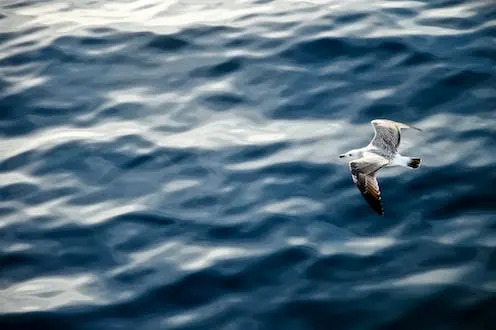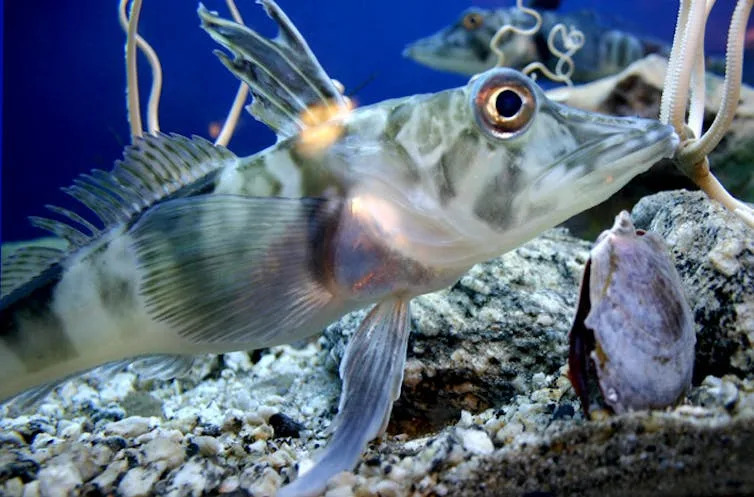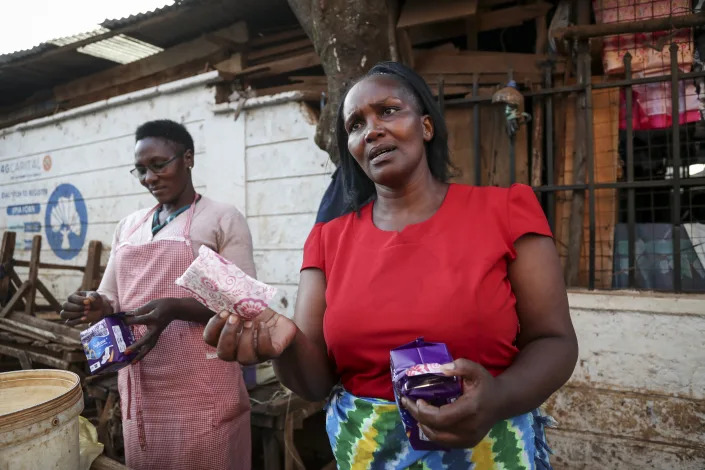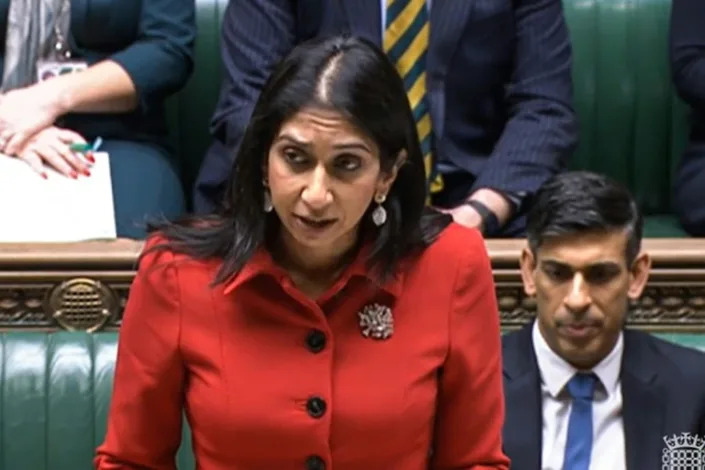Cornwall's underground power source could turbocharge Britain
Rachel Millard
Tue, March 7, 2023

Geothermal energy pioneers also want to extract lithium from Cornwall's waters
- eye35 / Alamy Stock Photo
The race to develop cleaner energy has sent engineers in several directions: out to sea to plant wind turbines, to the desert to plant solar panels, and into the laboratory to try and develop nuclear fusion.
At an industrial site in Cornwall, however, they are looking in another direction: deep underground.
Private company Geothermal Engineering has drilled more than three miles underground near Redruth, tapping into water at temperatures of up to 180 degrees centigrade.
It plans to harness that heat to generate electricity for the national electricity grid and warmth for nearby homes.
It would be the first deep geothermal power plant in the UK, when up and running as planned in 2024.
Geothermal Engineering has now raised £15m to get the project over the line, £12m of which is coming from Kerogen Capital, the private equity firm.
The $2bn [£1.6bn] asset manager has been best known for its investment in oil and gas, but is pushing into lower carbon sources and has a dedicated clean energy division, CelerateX.
Its investment into Geothermal Engineering comes amid a wider global push into deep geothermal energy as part of efforts to replace fossil fuels and cut carbon emissions.
Companies are rapidly developing new ways of drilling and extracting the warmth from deep underground, raising hopes deep geothermal could move from the niche into the mainstream.
“I think it can be very significant,” says Michael Liebreich, energy expert and chairman of Liebreich Associates, who is also chairman of the advisory board of deep geothermal developer Eavor.
“I think there's always been a strong understanding that it's a big opportunity - the challenge is how do you get it out, and how do you get it out economically.”
Deep geothermal currently makes a tiny contribution to the global energy system, with projects generally providing heat and electricity for small, local communities.
The complications, risk and expense of drilling deep underground and drawing out warmth has held the industry back, with little reason to invest heavily when other, competitive sources of energy are plentiful.
That equation is changing, however, because of efforts to diversify away from oil and gas, with billions of pounds now flowing into finding cleaner energy solutions and the price of carbon emissions going up in several economies.
Global concerns over energy security this winter after Russia’s war on Ukraine rocked oil and gas markets is also focusing minds on new solutions.
“The current situation – characterised by highly volatile oil and gas prices – provides renewed opportunities for geothermal energy to further develop as a strategic alternative in electricity generation, heating and cooling worldwide,” Irena, the International Renewable Energy Agency, said in a report last month.
New drilling techniques, including some developed through the natural gas fracking boom in the US, are also helping to push the industry forward.
In the US, for example, Quaise Energy is developing a new technique which uses super high energy laser beams to ‘drill’ through hard rock deep underground.
The company says the “radical new approach” should enable them to reach depths of up to 20 kilometres and temperatures up to 500 degrees celsius.
The technology was developed by scientists working on nuclear fusion at the Massachusetts Institute of Technology.
Carlos Araque, chief executive and co-founder, says he wants to build “clean electric generation and heat distribution plants within a short distance of every major population and industrial centre on the planet”.
In June, Quaise Energy raised $52m from companies including Techint Group, the Argentine conglomerate, and Safar Partners, US technology venture fund.
Before setting up Quaise, Mr Araque worked as a technology development manager at Schlumberger, the oilfield services company.
He is not alone in seeing the potential for assets and expertise from the fossil fuel industry to be redeployed.
In the oil and gas heartlands of Texas, oil and gas companies including Chevron and Halliburton have signed up to the new Texas Geothermal Energy Alliance.
"We've been drilling oil and gas wells for so long in Texas – over 1 million wells – that we have all this data about what's below the surface," Barry Smitherman, a former regulator in Texas, told S&P Global Platts last year. “That can inform geothermal developers about where to concentrate."
Meanwhile, in Europe heat is being extracted from an abandoned oil well in Kiskunhalas, Hungary, in a project officials hope could be replicated.
In South Wales, officials have been exploring whether water swirling through disused coal mines could be used to heat local homes.
Some investment is also coming from the fossil fuel sector. BP and Chevron have both backed Alberta-based Eavor.
Its approach involves using the geothermal warmth to heat water it pipes underground – acting like a large radiator – without needing to extract water from deep underground.
“Eavor has just dug the world’s deepest geothermal lateral in the world – we are really pushing the limits of drilling capability,” adds Mr Liebreich.
Geothermal is not without its problems: The process is energy intensive. In many cases, carbon dioxide dissolved in low quantities in water will also need capturing and sent back into the ground.
Geothermal drilling near Cornwall’s Eden Project had to be halted in March 2022 owing to seismic activity.
The UK’s banned natural gas fracking industry has argued geothermal drillers are treated unfairly given seismic risk.
However, the push away from fossil fuels gives geothermal a second impetus: electric car batteries need lithium, which can be extracted from geothermal waters at the same time as the heat.
In the UK, Geothermal Engineering is using a “binary” power plant.
Hot geothermal waters are piped from deep underground and used to heat a second fluid using a heat exchanger. The secondary liquid is used for steam to drive a turbine to produce electricity. The geothermal fluid is sent back underground.

Weekend; Beautiful park runs; Pix show the park run at the Eden Project, near St Austell, Cornwall.Pic Jay Williams 14-09-19 - JAY WILLIAMS
Once that project is up and running, the company wants to build a fleet of small power stations around Cornwall.
Much will depend, however, on the outcome of an upcoming government auction to secure its electricity prices, where geothermal will compete against other technologies.
Ryan Law, Geothermal Engineering’s chief executive, estimates the cost of generating electricity from the plants could be in the region of £100 per MWh, which is far more expensive than offshore wind and other technologies.
As well as power supplies and heat, it also wants to extract lithium from the geothermal waters, and has been testing the viability with various approaches.
Law says an announcement should be made on that front in the next couple of months.
“It's a very exciting sort of development for us and potentially huge for UK PLC," he says.
“We’ve taken it step by step to try and get the solutions right, so that when we do produce lithium then we have meaningful quantities.”
He and Kerogen Capital, which is taking a majority stake, argue its investment “fires the starting gun” on a wider deep geothermal energy industry in the UK.
“Right beneath our feet, we’ve got the potential to heat every home in the UK with geothermal,” says Jason Cheng, chief executive of Kerogen Capital.
“It's been a niche industry, but now it's set to scale."



















